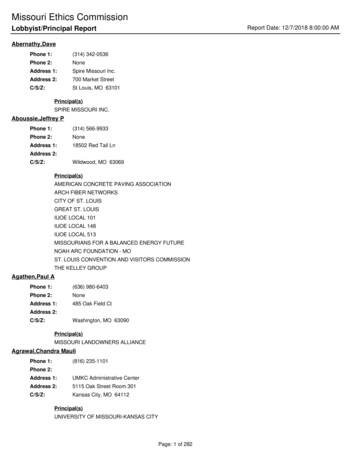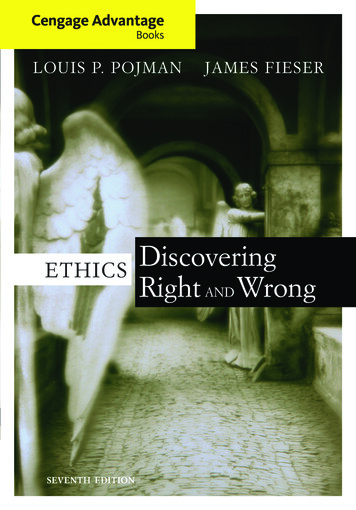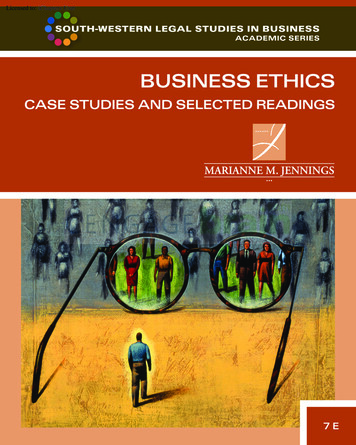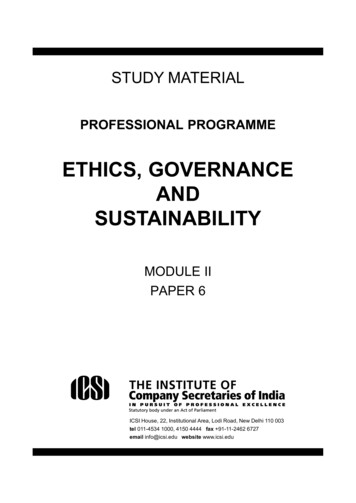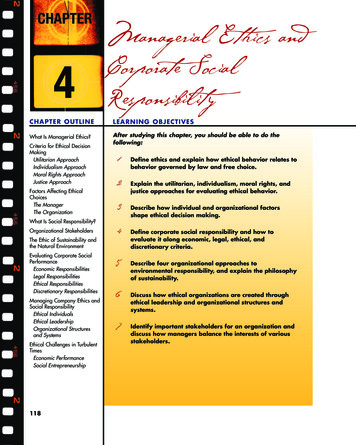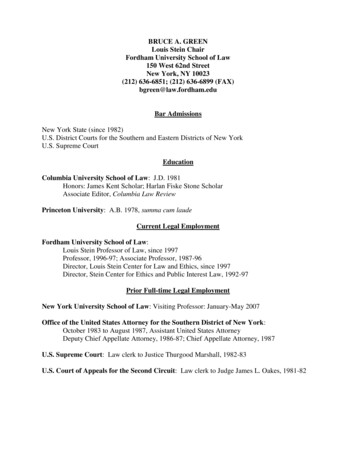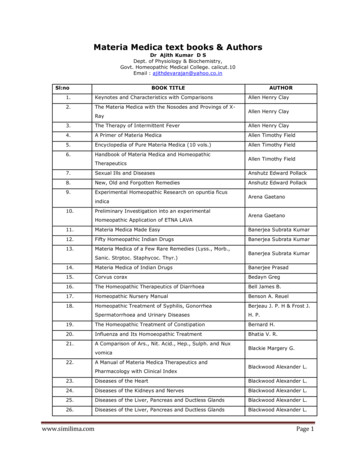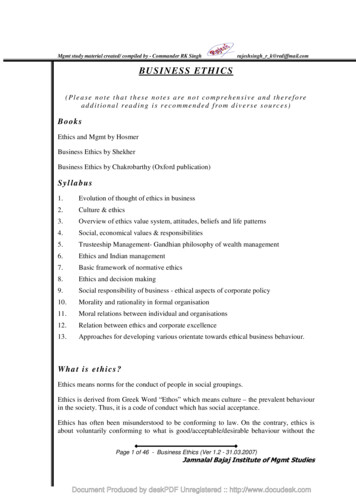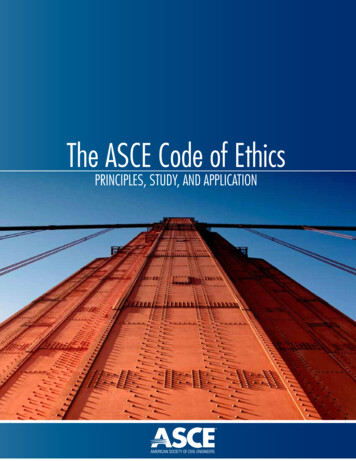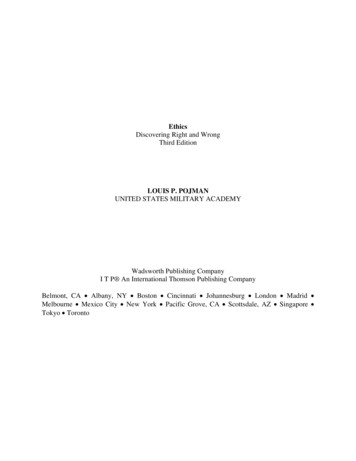
Transcription
EthicsDiscovering Right and WrongThird EditionLOUIS P. POJMANUNITED STATES MILITARY ACADEMYWadsworth Publishing CompanyI T P An International Thomson Publishing CompanyBelmont, CA Albany, NY Boston Cincinnati Johannesburg London Madrid Melbourne Mexico City New York Pacific Grove, CA Scottsdale, AZ Singapore Tokyo Toronto
vContents123PrefaceA Word to the Student: Why Study Moral Philosophy?Introduction: What Is Ethics?Morality As Compared with Other Normative SubjectsTraits of Moral PrinciplesDomains of Ethical AssessmentWhy Do We Need Morality?The Purposes of MoralityFor Further ReflectionFor Further ReadingEthical Relativism: Who's to JudgeWhat's Right and Wrong?An Analysis of RelativismSubjective Ethical Relativism (Subjectivism)Conventional Ethical Relativism (Conventionalism)A Critique of Ethical RelativismFor Further ReflectionFor Further ReadingThe Case for Moral ObjectivismNatural LawModerate Objectivismxixv13791317212426283033374243444551
vi4567An Explanation of the Attractionof Ethical RelativismFor Further ReflectionFor Further ReadingEgoism, Self-Interest, and AltruismAn Overview of the ProblemPsychological EgoismEthical EgoismA Critique of Ethical EgoismAttempted Refutations of EgoismEvolution and AltruismFor Further ReflectionFor Further ReadingValue: The Quest for the GoodWhat Types of Value Are There?What Things Are Good?Are Values Objective or Subjective?What Is the Relation of Value to Morality?What Is the Good Life?For Further ReflectionFor Further ReadingUtilitarianismWhat Is Utilitarianism?Two Types of UtilitarianismThe Strengths and Weaknesses of UtilitarianismExternal Criticisms of UtilitarianismUtilitarian Responses to Standard ObjectionsFor Further ReflectionFor Further ReadingKantian and Deontological SystemsTwo Types of Deontological SystemsKant's Rule-Deontological SystemThe Categorical 02104108112115117121126128130130135137
vii891011*Kant's Other Formulationsof the Categorical ImperativeKant’s Ethics and ReligionA Reconciliation ProjectFor Further ReflectionFor Further ReadingVirtue-Based Ethical SystemsThe Aretaic Critique of Action-Based(Deontic) Ethical SystemsThe Nature of Virtue EthicsTypes of Relationships betweenVirtue Ethics and Action EthicsFor Further ReflectionFor Further ReadingWhy Should I Be Moral?The Paradox of Morality and Self-InterestFor Further ReflectionFor Further ReadingReligion and EthicsDoes Morality Depend on Religion?Is Religious Ethics Essentially Differentfrom Secular Ethics?Is Religion Irrelevant orEven Inimical to Morality?Does Religion Enhance the Moral Life?For Further ReflectionFor Further ReadingThe Fact-Value Problem:Metaethics in the 20th CenturyNonnaturalismEmotivismPrescriptivismThe Renaissance of NaturalismFor Further ReflectionFor Further 91192193198199202206207208210215220230236237
viii12*Moral Realism and theChallenge of SkepticismMackie’s Error Theory of MoralityHarman's Moral NihilismFor Further Reading239242246254A Concluding Reflection:Minimal Morality, Virtue Ethics, and theDevelopment of Character255Appendix 1 An Analysis of theModified Divine Command Theory260Appendix 2 How to Read and Writea Philosophy Paper267GlossaryIndex272279
ixPrefaceIn all the world and in all of life there is nothing more important to determine than whatis right. Whatever the matter which lies before us calling for consideration, whatever thequestion asked us or the problem to be solved, there is some settlement of it which willmeet the situation and is to be sought. Wherever there is a decision to be made or anydeliberation is in point, there is a right determination of the matter in hand which is to befound and adhered to, and other possible commitments which would be wrong and are tobe avoided.C.I. LEWIS, THE GROUND AND NATURE OF RIGHT,COLUMBIA UNIVERSITY PRESS, 1955, p. 27WHY STUDY ETHICS?What is it to live a morally good life? Why is morality important? Are moral principles validonly as they depend on cultural approval or are there universal moral truths? How should I livemy life? Are there intrinsic values? Which is the best moral theory? Can we derive moral valuesfrom facts? Why should I be moral? Is there a right answer to every problem in life? What is therelationship of religion to morality?
xThese sorts of questions have concerned me for several years, and I believe that they shouldconcern all thoughtful individuals. Many people in our society; including university students, areconfused about morality On the one hand, many claim (as judged from questionnaires and inclass conversations) that they are moral relativists (which they suppose promotes tolerance). But(as judged from their answers to different questions) these same people believe in absolutereligious authority in faith and morals or answer no to questions such as "Is it ever morallypermissible to have an abortion - except to save a woman's life?" and "Is capital punishment evermorally justified?" They often uncritically hold either deontological, utilitarian, or egoistpositions without being aware of the problems inherent in those positions. In sum, such peopleare very far from having an articulate moral theory of their own to match their understanding ofliterature, science, math, or even basketball. Yet morality is more important than any of thesesubjects, for it goes to the heart of what it means to live in the right way.I am convinced that the subject of ethics is of paramount importance to us at the end ofthe 20th century. With the onset of pluralism and the loss of confidence in traditional authorities,a rational approach to ethics is vital if we are to survive and flourish. I disagree with manyethicists, including C. E. Moore in Principia Ethica (1903) and C. D. Broad in Five Types ofEthical Theory (1930), who dismiss ethics as merely theoretical and as having no practicalrelevance.On the contrary, ethical theory has enormous practical benefits. It can free us fromprejudice and dogmatism. It sets forth comprehensive systems from which to orient ourindividual judgments. It carves up the moral landscape so that we can sort out the issues in orderto think more clearly and confidently about moral problems. It helps us clarify in our minds justhow our principles and values relate to one another, and, most of all, it gives us some guidance inhow to live.ABOUT THIS BOOKHaving taught ethical theory for several years, I felt the need for a text-book that challenged thestudent to develop his or her own moral theory that emphasized the importance of the enterpriseand could serve as a guide for intelligent young people. The available textbooks were either toolight, sweeping over important distinctions, or too heavy; getting bogged down in needlessformalization, or too narrow, omitting a serious
xidiscussion of the virtues or the relationship between ethics and religion or the nature of values.This book is intended for undergraduates in ethics courses. I have tried to write in aninteresting, conversational manner, raising the key theoretical questions and analyzing themfairly closely without using unnecessary jargon. I have opened some chapters or included in thechapter discussion or in the sections entitled "For Further Reflection" at the end of each chapterexamples of moral problems in order that students might have material to which to apply thetheoretical discussion. It will be even better if students think up examples from their own lives.This book is comprehensive, covering the major issues in contemporary moral theory andincluding a discussion of classical as well as contemporary renditions of the problems. It has anoutline similar to that of my anthology, Ethics: Classical and Contemporary Readings, ThirdEdition (Wadsworth, 1998) and may be used as a companion to and commentary on that work.But the user of this text is free to change the order of presentation. For example, many teachers,including myself at times, like to deal with the relation of religion to morality; including thedivine command theory, early on in the course. Nothing will be lost by going directly fromChapter 1 ("Introduction") to Chapter 10 ("Religion and Ethics"). Chapter 5 ("Values") is relatedto Chapter 9 ("Why Should I Be Moral?"), so they may be read in sequence.I strive to be fair to opposing sides of every question, but whenever I do offer my ownsolutions to problems (in a single-author text this is virtually inevitable), I do so in the spirit offallibility and openness to correction, leaving the reader to form his or her own judgment on thematter. Philosophers will note that the title of this book reflects a fundamental disagreement withJ. L. Mackie, who entitled his influential work on ethics Ethics: Inventing Right and Wrong,whose work is discussed in Chapters 3 and 12. The late John Mackie, from whom I learned agreat deal, was my esteemed teacher at Oxford University, but I think that his starting point ismisleading. Ethics, although it contains an element of human creativity and inventiveness, iseven more clearly a discovery, something which is not of our own making but constitutes theblueprint for individual happiness and social harmony. Hence the subtitle of this book:Discovering Right and Wrong.The reader will note that I raise more questions than I answer. I do this in part becausewhat is important in philosophy is for the individual to work out his or her own solutions toproblems and in part because I am unsure of many of the solutions myself. Study questions and ashort, usable bibliography ("For Further Reading") accompany each chapter. A glossary appearsat the end of the book.
xiiIn this third edition I have revised most of the chapters, added more study questions, and added achapter on moral realism (Chapter 12), including a discussion of Mackie's error theory andGilbert Harman's moral nihilism.ACKNOWLEDGMENTSMichael Beaty, Jonathan Harrison, Bill Lawhead, Robert Louden, Laura Purdy, Roger Rigterink,Bruce Russell, Walter Schaller, Robert Audi, and Bob Westmoreland were very helpful inoffering trenchant criticisms on several chapters of this book. The students in my ethical theoryclasses at the University of Mississippi made a challenging sounding board for many of myarguments. Deserving of special mention are John Ates, Chris Bradford, Laura Burrell, ScottMorris, and Clayton Overton. Ronald E Duska, Rosemont College; Peter List, Oregon StateUniversity; Peter Vallentyne, Virginia Commonwealth University; and Stephen Griffith,Lycoming College, reviewed the manuscript for the first edition of this work. Arthur Kuflik,University of Vermont; Fred Schueler, University of New Mexico; R. Duane Thompson, IndianaWesleyan University; and David A. White, Marquette University, reviewed the manuscript forthe second edition. Peter Boltuc, St. Olaf College; R. L. Borton, Orange Coast CommunityCollege; Ronald Cox, San Antonio College; Jamie Dreier, Brown University; Ed Langerack, St.Olaf College; Robert Mellert, Brookdale Community College; Mark Michael, Austin Peay StateUniversity; Ken Schenck, Indiana Wesleyan University; Ed Sherline, University of Wyoming;and Gordon Whiting, Brigham Young University, reviewed this work for the third edition. Eachof the reviewers greatly enhanced the finished text.I am grateful to Peter Adams for his strong support of this third edition. Kate Barrett didan excellent job of putting this work into its final form. I'm grateful to Douglas Becker for hishelpful copyediting of the manuscript and to Ruth Stevens for proofreading this work. Most ofall, I am indebted to my wife, Trudy, for living a morally inspiring life. Without her love anddevotion, my life would be less joyous and this book would not have been written. To her thisbook is dedicated.-LOUIS P. POJMAN
A Word to the Student: Why Study Moral Philosophy?Ethics, or moral philosophy, is one branch of philosophy. What is philosophy? It is an enterprisethat begins with wonder at the marvels and mysteries of the world, that pursues a rationalinvestigation of those marvels and mysteries, seeking wisdom and truth, and that results in a lifelived in passionate moral and intellectual integrity. Believing that "the unexamined life is notworth living,” philosophy leaves no facet of life untouched by its inquiry. It aims for a clear,critical, comprehensive conception of reality.The hallmark of philosophy is rational argument. Philosophers clarify concepts andanalyze and test propositions and beliefs, but their major task is to analyze and constructarguments. Philosophical reasoning is closely allied with scientific reasoning, in that both buildhypotheses and look for evidence to test those hypotheses with the hope of coming closer to thetruth. However, scientific experiments take place in laboratories and have testing procedures torecord objective or empirically verifiable results. The laboratory of the philosopher is the domainof ideas - the mind, where imaginative thought-experiments take place; the study where ideas arewritten down and examined; and wherever conversation or debate about the perennial questionstakes place, where thesis and counterexample and counterthesis are considered.Let us apply this to ethics. Ethics is that branch of philosophy that deals with how weought to live, with the idea of the Good, and with such concepts as “right” and “wrong.” As such,it is a practical discipline. There are two parts
xivto the study of ethics: the theoretical and the applied. The theoretical aspect, "ethical theory;"deals with comprehensive theories about the good life and moral obligation. It analyzes andconstructs grand systems of thought in order to explain and orient agents to the moral life.Included in this domain is a close analysis of concepts such as "right," "wrong,” “permissible”,and the like. The applied aspect, "applied ethics” deals with moral problems, including questionsabout the morality of abortion, premarital sex, capital punishment, euthanasia, and civildisobedience. Ethical theory and applied ethics are closely related: theory without application issterile and useless, but action without a theoretical perspective is blind. There will be anenormous difference in the quality of discussions about abortion, punishment, sexual morality,and euthanasia when those discussions are informed by ethical theory as compared to when theyare not. More light and less heat will be the likely outcome.With the onset of pluralism and the loss of confidence in traditional authorities, a rationalapproach to ethics is vital for us to survive and thrive. Ethical theory may rid us of faciledogmatism and emotionalism - where shouting matches replace arguments - and liberate us fromwhat Bernard Williams refers to as "vulgar relativism." Ethical theory clarifies relevant concepts,constructs and evaluates arguments, and guides us in living our lives. It is important that theeducated person be able to discuss ethical situations with precision and subtlety.Ethics is not only of instrumental value; it is valuable in its own right. It is satisfying tohave knowledge of important matters for its own sake, and it is important to understand thenature and scope of moral theory for its own sake. We are rational beings who cannot help butwant to understand the nature of the good life and all that it implies. You may become disturbedby the variety of theories discussed in this book, which seem mutually exclusive and so produceconfusion when you desire guidance. But an appreciation of the complexity of ethics is valuablein offsetting our tendency toward dogmatism and provincialism. It is also a challenge to use yourreason to endorse or produce the best system or combination of systems possible.I have written this book as a quest for truth and understanding, hoping to createexcitement about the value of ethics. It is a subject that I love, for it is about how we are to live,about the best kind of life. I hope that you will come to share my enthusiasm for the subject andto develop your own ideas in the process.I would be delighted to hear your thoughts or questions on the ideas in this book,including any suggestions for ways to improve the work. Feel free to write to me at the followingaddress:Louis P PojmanUnited States Military AcademyWest Point, NY, 10996
1IIntroduction: What Is Ethics?We are discussing no small matter, but how we ought to live.SOCRATES, IN PLATO'S REPUBLICSome years ago, the nation was stunned by a report from Kew Gardens, Queens, in New YorkCity. A young woman, Kitty Genovese, was brutally stabbed in her neighborhood late at nightduring three separate attacks while thirty-eight respectable, law-abiding citizens watched andlistened. Her neighbors looked on from their bedroom windows for some thirty-five minutes asthe assailant beat her, stabbed her, left her, and returned to repeat the attack two more times untilshe died. No one lifted a phone to call the police; no one shouted at the criminal, let alone wentto Genovese's aid. Finally, a seventy-year-old woman called the police. It took them two minutesto arrive, but by that time Genovese was dead. Only one other woman came out to testify beforethe ambulance came, which was an hour later. Then residents from the whole neighborhoodpoured out of their apartments. When asked why they hadn't done anything, they gave answersranging from "I don't know" and "I was tired" to "Frankly, we were afraid."1Who are our neighbors? What should these respectable citizens have done? What wouldyou have done? If, with little inconvenience to yourself,
2you could save someone's life or save someone from harm, would you be partly responsible forany harm done to that person if you chose not to act? Are such acts of omission morallyblameworthy? How much risk should we undergo to help someone in danger? What kinds ofgeneralizations can we make from this episode about contemporary culture in America? Whatdoes the crime rate in our cities tell us about the moral climate of our society? Is the Genovesemurder an anomaly, or is it quite indicative of a deeply disturbing trend?What is it to be a moral person? What is the nature of morality? Why do we needmorality? What function does it play? What is the good, and how shall I know it? Are moralprinciples absolute, or are they simply relative to social groups or individual decision? Ismorality, like beauty, in the eye of the beholder? Is it always in my interest to be moral? Or is itsometimes in my best interest to act morally? How do we justify our moral beliefs? What is thebasis of morality? Which ethical theory best justifies and explains the moral life? Whatrelationship does morality have with religion, law, and etiquette?These are some of the questions we shall be looking at in this book. We want tounderstand the foundation and structure of morality. We want to know how we should live.The terms "moral" and "ethics" come from Latin and Greek, respectively ("mores" and"ethos"), deriving their meaning from the idea of "custom”. Although philosophers sometimesuse these terms interchangeably, many philosophers distinguish among morality, moralphilosophy, and ethics. I generally use morality to refer to certain customs, precepts, andpractices of people and cultures. This is sometimes called positive morality or descriptivemorality (since it describes actual beliefs and customs). I use moral philosophy ot refer tophilosophical or theoretical reflection on morality. Specific moral theories issuing from suchphilosophical reflection I call ethical theories, in line with a common practice. I use ethics torefer to the whole domain of morality and moral philosophy, since these two areas have manyfeatures in common. For example, both areas concern values, virtues, and principles andpractices, though in different ways.Moral philosophy refers to the systematic endeavor to understand moral concepts andjustify moral principles and theories. It undertakes to analyze concepts and terms such as "right”,"wrong”, "permissible”, "ought”, "good”, and "evil" in their moral contexts. Moral philosophyseeks to establish principles of right behavior that may serve as action guides for individuals andgroups. It investigates which values and virtues are paramount to a worth-while life or society. Itbuilds and scrutinizes arguments in ethical theories and seeks to discover valid principles (e.g.,"Never kill innocent human
3beings") and the relationship between valid principles (e.g., "Does saving a life in somesituations constitute a valid reason for breaking a promise?").MORALITY AS COMPARED WITH OTHER NORMATIVE SUBJECTSMoral precepts concern norms; roughly speaking, they concern not what is, but what ought to be.How should I live my life? What is the right thing to do in this situation? Should I always tell thetruth? Do I have a duty to report a coworker whom I have seen cheating our company? Should Itell my friend that his spouse is having an affair? Is premarital sex morally permissible? Ought awoman ever to have an abortion? Morality has a distinct action-guiding, or normative, aspect,2which it shares with other practical institutions, such as religion, law; and etiquette.Moral behavior, as defined by a given religion, is usually believed essential to thatreligion's practice. But neither the practices nor precepts of morality should be identified withreligion. The practice of morality need not be motivated by religious considerations. And moralprecepts need not be grounded in revelation or divine authority - as religious teachings invariablyare. The most salient characteristic of ethics - by which I mean both philosophical morality (ormorality, as I will simply refer to it) and moral philosophy-is its grounding in reason and humanexperience.To use a spatial metaphor, secular ethics is horizontal, lacking a vertical or transcendentaldimension. Religious ethics, being grounded in revelation or divine authority, has that verticaldimension, though religious ethics generally uses reason to supplement or complementrevelation. These two differing orientations often generate different moral principles andstandards of evaluation, but they need not do so. Some versions of religious ethics, which positGod's revelation of the moral law in nature or conscience, hold that reason can discover what isright or wrong even apart from divine revelation. We will discuss this subject in Chapters 3(under natural law) and 10.Morality is also closely related to law; and some people equate the two practices. Manylaws are instituted in order to promote well-being, resolve conflicts of interest, and promotesocial harmony, just as morality does, but ethics may judge that some laws are immoral withoutdenying that they are valid laws. For example, laws may permit slavery, spousal abuse, racialdiscrimination, or sexual discrimination, but these are immoral practices. A Catholic orantiabortion advocate may believe that the laws permitting abortion are immoral.
4In a 1989 PBS television series, "Ethics in America”, James Neal, a trial lawyer, was asked whathe would do if he discovered that his client had committed a murder some years earlier for whichanother man had been convicted and would soon be executed.3 Neal said that he had a legalobligation to keep this information confidential and that, if he divulged it, he would be disbarred.It is arguable that he has a moral obligation that overrides his legal obligation and demands thathe act to save the innocent man from execution.Furthermore, some aspects of morality are not covered by law. For example, although itis generally agreed that lying is usually immoral, there is no general law against it (except underspecial conditions, such as committing perjury or falsifying income tax returns). Sometimescollege newspapers publish advertisements by vendors who offer "research assistance," despiteknowing in advance that these vendors will aid and abet plagiarism. Publishing such ads is legal,but its moral correctness is doubtful. The thirty-eight people who watched the attacks on KittyGenovese and did nothing to intervene broke no New York law; but they were very likelymorally culpable for their inaction.4There is one other major difference between law and morality. In 1351, King Edward ofEngland promulgated a law against treason that made it a crime merely to think homicidalthoughts about the king. But, alas, the law could not be enforced, for no tribunal can search theheart and fathom the intentions of the mind. It is true that intention, such as malice afore-thought,plays a role in determining the legal character of an act, once the act has been committed. Butpreemptive punishment for people who are presumed to have bad intentions is illegal. Ifmalicious intentions ("mens rea," in law) were illegal, wouldn't we all deserve imprisonment?Even if one could detect others' intentions, when should the punishment be administered? Assoon as the offender has the intention? But how do we know that the offender won't change hisor her mind? Furthermore, isn't there a continuum between imagining some harm to X, wishing aharm to X, desiring a harm to X, and intending a harm to X?Although it is impractical to have laws against bad intentions, these intentions are stillbad, still morally wrong. Suppose I buy a gun with the intention of killing Uncle Charlie in orderto inherit his wealth, but I never get a chance to fire it (for example, suppose Uncle Charliemoves to Australia). Although I have not committed a crime, I have committed a moral wrong.Finally, law differs from morality in that there are physical and financial sanctions5 (e.g.,imprisonment and fines) enforcing the law but only the sanction of conscience and reputationenforcing morality.
5Morality also differs from etiquette, which concerns form and style rather than the essence ofsocial existence. Etiquette determines what is polite behavior rather than what is right behaviorin a deeper sense. It represents society's decision as to how we are to dress, greet one another,eat, celebrate festivals, dispose of the dead, express gratitude and appreciation, and, in general,carry out social transactions. Whether people greet each other with a handshake, a bow, a hug, ora kiss on the cheek depends on their social system. People in Russia wear their wedding ring onthe third finger of the right hand, whereas we wear it on the left hand. People in England holdtheir fork in the left hand, whereas people in other countries hold it in the right hand orwhichever hand they prefer. People in India typically eat without a fork at all, using theforefingers of the right hand to convey food from the plate to the mouth. Whether we uncoverour heads in holy places (as males do in Christian churches) or cover them (as females do inCatholic churches and males do in synagogues), none of these rituals has any moral superiority.Polite manners grace our social existence, but they are not what social existence is about. Theyhelp social transactions to flow smoothly but are not the substance of those transactions.At the same time, it can be immoral to disregard or flout etiquette. Whether to shakehands when greeting a person for the first time or put one's hands together in front as one bows,as people in India do, is a matter of cultural decision. But once the custom is adopted, thepractice takes on the importance of a moral rule, subsumed under the wider principle of ShowRespect to People. Similarly, there is no moral necessity to wear clothes, but we have adoptedthe custom partly to keep warm in colder climates and partly to be modest. But there is nothingwrong with nudists who decide to live together in nudist colonies. However, for people to gonude outside of nudist colonies, say, in classrooms, stores, and along the road may well be sooffensive that it is morally insensitive. Recently, there was a scandal on the beaches of southIndia, where American tourists swam in bikinis, shocking the more modest Indians. There wasnothing immoral in itself about wearing bikinis, but given the cultural context, the Americanswillfully violated etiquette and were guilty of moral impropriety.Although Americans pride themselves on tolerance, pluralism, and awareness of othercultures, custom and etiquette can be - even among people from similar backgrounds - a bone ofcontention. A friend of mine, John, tells of an experience early in his marriage. He and his wife,Gwen, were hosting their first Thanksgiving meal. He had been used to small celebrations withhis immediate family, whereas his wife had been used to grand celebrations. He writes, "I hadbeen asked to carve, something I had never done before, but I was willing. I put on an apron,entered the kitchen, and
6attacked the bird with as much artistry as I could muster. And what reward did I get? (My wife)burst into tears. In her family the turkey is brought to the table, laid before the (father), grace issaid, and then he carves! 'So I fail patriarchy,’ I hollered later. 'What do you expect?' "6Law, etiquette, and religion are all important institutions, but each has limitations. Alimitation of law is that you can't have a law against every social malady, nor can you enforceevery desirable rule. A limitation of etiquette is that it doesn't get to the heart of what is vitallyimportant for personal and social existence. Whether or not one eats with one's fingers pales insignificance when compared with the importance of being honest or trustworthy or just. Etiquetteis a cultural invention, but morality claims to be a discovery. A limitation of religious injunctionis that it rests on authority and we may lack certainty or agreement about the authority'scredentials or how the authority would rule in ambiguous or new cases. Since religion is foundednot on reason but on revelation, you cannot use reason to convince someone from anotherreligion
misleading. Ethics, although it contains an element of human creativity and inventiveness, is even more clearly a discovery, something which is not of our own making but constitutes the blueprint for individ
